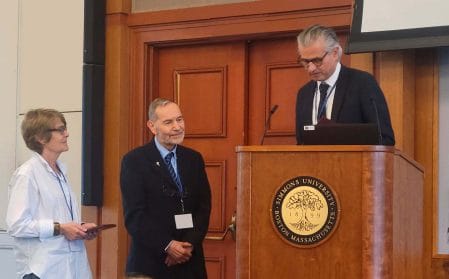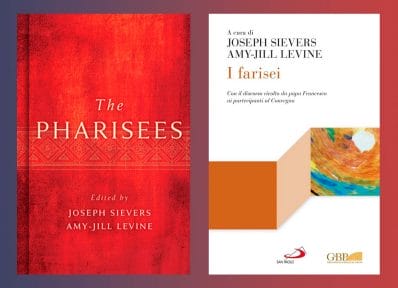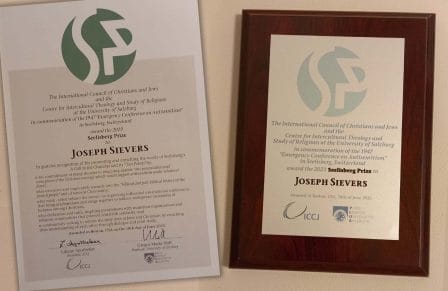As part of the opening event of the International Conference of the International Council of Christians and Jews (ICCJ) in Boston, USA, on Sunday 18 June, Prof. Joseph Sievers was awarded the 2023 Seelisberg Prize. Our interview on his return to Rome. The Seelisberg Prize is inspired by and intended to commemorate the ground-breaking gathering that took place in the small Swiss village of Seelisberg from 30 July to 5 August 1947 to address Christian teachings regarding discrimination against Jews and Judaism. This event is widely recognised as inaugurating the transformation in relations between Jews and Christians.  The Seelisberg Prize is awarded annually (since 2022) by the International Council of Christians and Jews (ICCJ) which originated from the Seelisberg conference, and the Centre for Intercultural Theology and Religions at the University of Salzburg. It honours individuals who have played important roles through their scholarship and teaching in promoting rapprochement between Jews and Christians. Prof. Dr. Joseph Sievers (Seelisberg Prize 2023) was born and raised in Germany and began his studies at the University of Vienna and the Hebrew University of Jerusalem. He holds a PhD in Ancient History from Columbia University (1981) and a Lic. Theol. from the Pontifical Gregorian University (1997). He has taught at CUNY, Seton Hall Univ., Fordham Univ. and other institutions in the US, Italy and Israel. From 1991 until 2023, he taught Jewish history and literature of the Hellenistic period at the Pontifical Biblical Institute in Rome, where he was a full professor. In addition, from 2003 to 2009 he was Director of the Cardinal Bea Centre for Jewish Studies at the Pontifical Gregorian University. Since 1965 he has been a member of the Focolare Movement, with whose Centre for Interreligious Dialogue he has collaborated since 1996. He has published several books and numerous articles, primarily in the areas of Second Temple history (in particular Flavius Josephus) and Christian-Jewish relations. With Amy-Jill Levine, he edited The Pharisees (Grand Rapids, MI: Eerdmans, 2021; Italian translation Milan, San Paolo, 2021; German translation planned for 2024). Professor Sievers, what does it mean to you to receive this award? It was a great surprise and when I was asked to say something about my experience, I felt a great gratitude looking back, thinking about all the moments, all the people I met, the situations in which I was able to be there and sometimes be of help. A great gratitude and, at the same time, a responsibility for the present and the future. In his speech at the award ceremony you said: “Difficulties can help us understand one another better. Difficulties can unite us”. In your long experience of this dialogue, what have been the most difficult and also the most surprising moments where you were still able to say “Anything’s possible”?
The Seelisberg Prize is awarded annually (since 2022) by the International Council of Christians and Jews (ICCJ) which originated from the Seelisberg conference, and the Centre for Intercultural Theology and Religions at the University of Salzburg. It honours individuals who have played important roles through their scholarship and teaching in promoting rapprochement between Jews and Christians. Prof. Dr. Joseph Sievers (Seelisberg Prize 2023) was born and raised in Germany and began his studies at the University of Vienna and the Hebrew University of Jerusalem. He holds a PhD in Ancient History from Columbia University (1981) and a Lic. Theol. from the Pontifical Gregorian University (1997). He has taught at CUNY, Seton Hall Univ., Fordham Univ. and other institutions in the US, Italy and Israel. From 1991 until 2023, he taught Jewish history and literature of the Hellenistic period at the Pontifical Biblical Institute in Rome, where he was a full professor. In addition, from 2003 to 2009 he was Director of the Cardinal Bea Centre for Jewish Studies at the Pontifical Gregorian University. Since 1965 he has been a member of the Focolare Movement, with whose Centre for Interreligious Dialogue he has collaborated since 1996. He has published several books and numerous articles, primarily in the areas of Second Temple history (in particular Flavius Josephus) and Christian-Jewish relations. With Amy-Jill Levine, he edited The Pharisees (Grand Rapids, MI: Eerdmans, 2021; Italian translation Milan, San Paolo, 2021; German translation planned for 2024). Professor Sievers, what does it mean to you to receive this award? It was a great surprise and when I was asked to say something about my experience, I felt a great gratitude looking back, thinking about all the moments, all the people I met, the situations in which I was able to be there and sometimes be of help. A great gratitude and, at the same time, a responsibility for the present and the future. In his speech at the award ceremony you said: “Difficulties can help us understand one another better. Difficulties can unite us”. In your long experience of this dialogue, what have been the most difficult and also the most surprising moments where you were still able to say “Anything’s possible”?  There have been various difficult moments, but one that I particularly remember is when we had to organise a meeting for dialogue in Jerusalem in 2009. It took place a few weeks after a conflict which had left many people dead or wounded. At the same time there was the situation of Bishop (Richard Nelson) Williamson denying the holocaust. There were difficulties on all sides that made open dialogue very difficult. However, we still managed to hold the meeting. We went ahead and they were very strong, spiritual moments of communion, beyond all the problems. And then you also ask me the things that were possible, despite the difficulties? It certainly was not easy to organise a conference on the Pharisees and then publish a book. There were several points where I felt the way was barred, either for financial reasons or because someone did not agree with what we wanted to do, or because it seemed impossible to have an audience with the Pope, for a conference of this type… Instead, by collaborating – and it really was a collaboration, especially with a Jewish colleague, but also with others – it was possible to solve these problems and give something that was based on serious studies but also addressed to concrete situations in churches and parishes. Certainly there was success that did not have an immediate effect everywhere, but for example one bishop wrote to me saying “now we need to change all our teaching on the Pharisees and Judaism in the seminaries”. That is already something. How has your membership of the Focolare Movement affected this experience? Without the Focolare Movement I probably would not have entered this field. The Movement gave me the impetus to study the languages of the Bible and everything else followed from that. I entered the focolare on 28 October 1965. It was a Thursday. I arrived in the focolare in Cologne (Germany) with my bicycle that I’d brought by train with my two suitcases on the same evening that the Council in Rome was approving Nostra Aetate (Declaration on the Relations of the Church with Non-Christian Religions). This has always meant a lot to me, linking commitment to the Movement with commitment to dialogue. You were also called to officially collaborate in the Catholic Church’s dialogue with the Jews… Yes. Since 2008 I have been a Consultant of the Commission for Religious Relations with Judaism, a commission of the Holy See. And I have participated in various meetings of the ILC in Buenos Aires, Cape Town or even Budapest, Madrid, Warsaw, Rome … And are steps forward being made?
There have been various difficult moments, but one that I particularly remember is when we had to organise a meeting for dialogue in Jerusalem in 2009. It took place a few weeks after a conflict which had left many people dead or wounded. At the same time there was the situation of Bishop (Richard Nelson) Williamson denying the holocaust. There were difficulties on all sides that made open dialogue very difficult. However, we still managed to hold the meeting. We went ahead and they were very strong, spiritual moments of communion, beyond all the problems. And then you also ask me the things that were possible, despite the difficulties? It certainly was not easy to organise a conference on the Pharisees and then publish a book. There were several points where I felt the way was barred, either for financial reasons or because someone did not agree with what we wanted to do, or because it seemed impossible to have an audience with the Pope, for a conference of this type… Instead, by collaborating – and it really was a collaboration, especially with a Jewish colleague, but also with others – it was possible to solve these problems and give something that was based on serious studies but also addressed to concrete situations in churches and parishes. Certainly there was success that did not have an immediate effect everywhere, but for example one bishop wrote to me saying “now we need to change all our teaching on the Pharisees and Judaism in the seminaries”. That is already something. How has your membership of the Focolare Movement affected this experience? Without the Focolare Movement I probably would not have entered this field. The Movement gave me the impetus to study the languages of the Bible and everything else followed from that. I entered the focolare on 28 October 1965. It was a Thursday. I arrived in the focolare in Cologne (Germany) with my bicycle that I’d brought by train with my two suitcases on the same evening that the Council in Rome was approving Nostra Aetate (Declaration on the Relations of the Church with Non-Christian Religions). This has always meant a lot to me, linking commitment to the Movement with commitment to dialogue. You were also called to officially collaborate in the Catholic Church’s dialogue with the Jews… Yes. Since 2008 I have been a Consultant of the Commission for Religious Relations with Judaism, a commission of the Holy See. And I have participated in various meetings of the ILC in Buenos Aires, Cape Town or even Budapest, Madrid, Warsaw, Rome … And are steps forward being made?  One step is already being open to meet and talk to each other and to overcome difficulties along the way. Sometimes it is better to face everything over dinner together than with fiery letters. Steps are being taken and certainly there is much more to be done, the network needs to be expanded. I mean, most Christians and most Jews are not involved. Sometimes they don’t even know that there are these relationships or that we are on this journey together. There is still a lot to be done to make this known and apply it. One thing I have learned a lot from my relationships with Jews is that the questions are sometimes more important than the answers. That is, I do not and cannot claim to have all the answers. So I cannot approach the other person as someone who has found all the answers and approaches him or her from a position of superiority. My position is to be a seeker together. It is this – most dramatically when dealing with the subject of the Shoah, the Holocaust – that has to be faced together sooner or later. One thing that is essential is to look at, to be as sensitive as possible to each other’s commitments and needs. And then also to be open, and if you make a mistake you can always start again if the intention is right, tiptoeing into the other person’s environment, not with the attitude of someone who says “I know everything”. Lastly, in receiving this award, apart from feeling grateful, does it inspire Joseph Sievers in any other way? Yes, indeed. For example, there are some open questions and this stimulates me to tackle them more. And maybe it even gives me some authority to address them with certain people. I don’t know if this will happen, but it is also an incentive to continue this work, which is not finished, which will never be finished, but where some steps can be taken together.
One step is already being open to meet and talk to each other and to overcome difficulties along the way. Sometimes it is better to face everything over dinner together than with fiery letters. Steps are being taken and certainly there is much more to be done, the network needs to be expanded. I mean, most Christians and most Jews are not involved. Sometimes they don’t even know that there are these relationships or that we are on this journey together. There is still a lot to be done to make this known and apply it. One thing I have learned a lot from my relationships with Jews is that the questions are sometimes more important than the answers. That is, I do not and cannot claim to have all the answers. So I cannot approach the other person as someone who has found all the answers and approaches him or her from a position of superiority. My position is to be a seeker together. It is this – most dramatically when dealing with the subject of the Shoah, the Holocaust – that has to be faced together sooner or later. One thing that is essential is to look at, to be as sensitive as possible to each other’s commitments and needs. And then also to be open, and if you make a mistake you can always start again if the intention is right, tiptoeing into the other person’s environment, not with the attitude of someone who says “I know everything”. Lastly, in receiving this award, apart from feeling grateful, does it inspire Joseph Sievers in any other way? Yes, indeed. For example, there are some open questions and this stimulates me to tackle them more. And maybe it even gives me some authority to address them with certain people. I don’t know if this will happen, but it is also an incentive to continue this work, which is not finished, which will never be finished, but where some steps can be taken together.
Carlos Mana




0 Comments